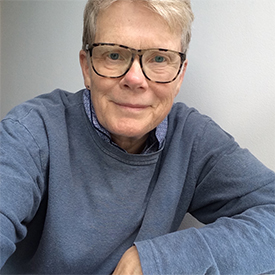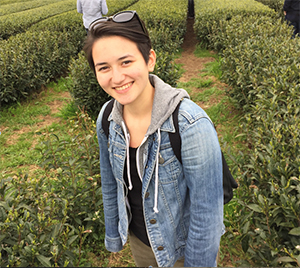The Narrative is the Boss: L'Amour Lisik in Conversation with Betsy Warland

Malahat marketing assistant L'Amour Lisik talks with Open Season Award creative nonfiction judge Betsy Warland about gender bending, queer writing in Canada, and the mind of the narrative.
Betsy Warland has published 12 books of creative nonfiction, poetry and lyric prose. A creative writing teacher, mentor and editor for the past 25 years, Warland works with writers from across Canada. Her bestseller book of essays Breathing the Page—Reading the Act of Writing was published in 2010. Oscar of Between – A Memoir of Identity and Ideas – was one of two books that launched Caitlin Press' Dagger Editions in 2016. Read more here.
As always, I have to ask: What elements in particular are you going to search out in Open Season creative nonfiction entries?
Simply said: an a-typical narrative position/voice (or the revitalizing of a typical one); a narrative that takes me internally and/or externally somewhere I've never quite been; an idiosyncratic inquiry into received notions, attitudes and values; a form that embodies the specific nature of the narrative; the crafting of every sentence informed by the narrative's specific voice and "body language," and finally if applicable, a writing style that draws upon other genre sensibilities and strategies.
Looking at the books you've written, I noticed many of them explore borders and in-between spaces within genres, genders, love, and mortality. Would you be willing to accept a genre-bending creative nonfiction/poetry piece or creative nonfiction/fiction piece as a finalist? Do you have any hard and fast rules when it comes to creative nonfiction as a genre? (For example, some creative nonfiction writers make composite characters, or only recall dialogue from memory.)
Genre-bending and blending? Yes, happily and absolutely! Have I any rules? No. For me, creative nonfiction, by its very nature, defies "hard and fast rules." They are the antithesis of this kind of inquiry and evocation. As a writer of creative nonfiction, and co-founder of the Creative Non-Fiction Collective, it's evident that as a genre, creative nonfiction is still in the early stages of defining itself. I love this about it. It's very liberating. It's mostly free from the posturing that can happen with genres that have been rigorously defined and defended over the centuries. For writers in the academy and freelance journalist, there is a tendency to assert a more restrictive definition as it's needed in those fields. But for many of us, this is not the case.
More and more, I think it to be a very suitable genre for our time. For me, the genre interrogates and seeks to replicate how narrative and logic actually transpires in my mind. In my 2016 book, Oscar of Between – A Memoir of Identity and Ideas, I had an exciting breakthrough with the narrative voice and position. While on a visit to London, England, I took a second name (Oscar) for a significant part of me that had never had a name. This, in turn, inspired a new narrative position ("a person of between") that ignited and fuelled the entire book.
Perception (intellectually, spiritually, emotionally) patches itself together in a rather unpredictable-synaptic, looping way. This harkens back to the French writer Michel de Montaigne. The origin of the word is the French word essayer, "to try" or "to attempt."From the beginning, it was recognized as a meandering exploration. In my creative nonfiction writing, evoking the phenomenological act of discovery is paramount.
Oscar of Between features themes of queerness and identity. How do you think queer literature has changed since you first started writing? Do you have any favourite books featuring and/or written by queer writers?
This is an important question, L'Amour. I'm glad you asked it as there's far too little knowledge of this history. It deserves a more extended reply so I apologize for my brevity. Excepting the amazing exception of U.S.A. immigrant Jane Rule's 1964 novel Desert Hearts, there had only been one lesbian-authored book in English Canada a few years prior to the publication of my first book, A Gathering Instinct (1981). As with my book, the lesbian orientation in Conversations with Bibi (1975) by Alexa De Wiel, was subtle. During those years, feminist women writers and writers of colour were fighting for recognition of a much broader range of our lived experience to be accepted as literary subject matter. In English Canada, women's queer writing wasn't even on the table.
In 1984, Daphne Marlatt's (Touch to My Tongue) and my companion book (open is broken) were the first erotic lesbian love poems published in English Canada and it was seismic. To my knowledge, no queer women couple has published erotic love poems since. How has it changed? Although queer women's identity and experience has indeed become more acceptable as a literary topic (Jane Rule, Dionne Brand, Shani Mootoo) it's still corralled and rarely shortlisted or awarded. In Quebec, queer feminist writing has been considerably more respected particularly for writers such as Nicole Brossard, Mary Meigs, Erin Moure, etc.
Thinking English and French Canada, Nicole Brossard's books continue to be important companions to me as over the decades. Among many authors, books by mid-career writers like Rachel Zolf, Rachel Rose, Jen Currin and younger writers such as Ali Blythe, Oana Avasilichioaei, Mercedes Eng, Metta Bach also companion me.
As a teacher and an editor, what advice would you give to writers who want to become better editors for themselves and for others?
As an author, a manuscript editor, and a mentor in Vancouver Manuscript Intensive and The Writer's Studio at Simon Fraser University, I can say with certainty that every writer needs editorial help and training. This has always been the case but it even more so in the current publishing environment. Fewer and fewer publishers can afford to provide significant editing assistance. The majority of publishers (and agents) are only considering manuscripts that are resolved and almost in ready to print shape. So, accept that you will have to invest in your manuscript and pay editors and manuscript consultants. Also, educate yourself via self-editing skills workshops or courses. Move beyond the mentality of making corrections on English class essays and recognize that self-editing is not utterly dissimilar to the act of inscription. It's also a creative act. In some respect, it's even a more satisfying activity as it offers a fine-tuning your piece that's so pleasurable.
In terms the last part of your question above, my mantra is: "The narrative knows where it's going; the narrative is the boss." Respect and trust it. Don't get in its way! So, whether you are editing and revising your own MSS or giving editing suggestions to another writer's MSS, become aware of your own assumptions, preferences and habits. Only then can you recognize when they are getting in the way.
An Open Season winner may go on to pursue a book deal. You've had numerous books published in your career—do you have any tips for writers looking to get their first book off the ground?
In addition to the above, often the first thing a publisher checks is your online presence as a writer: do you have a dynamic writer's website? Have you sought out training in creative writing degree and certificate programs, courses and workshops? Are you actively participating in the literary community via professional social media and giving readings? Have you been getting published in journals and anthologies? Have you worked on literary journals such as this one? Also, have you done market research and know what books are out there that have some similarities to yours that have fared well. That said, be prepared to make a strong case about how yours is unique, that these other books and your testing out of your manuscript (via readings and pieces published) validates a vibrant readership for your book. Also, prepare solid ideas about how you will actively promote your book as authors are having to do more and more of this.
What are you reading right now, what's next on your list to read? Do you have any upcoming projects you're working on?
Very recently: Aislinn Hunter's poetry collection Linger, Still; Rebecca Solnit's collection of essays A Field Guide To Getting Lost; Ta-nehisi Coates' nonfiction letter to his son Between the World and Me; Natale Caples' poetry narrative The Semiconducting Dictionary (Our Strindberg); Rachel Cusks' novel Outline; Leanne Dunic's novel/poem To Love The Coming End and Jonina Kirton's poetry collection An Honest Woman. I've just finished reading Sherman Alexi's biography on his mother, and am nearing the end of Madeline Thien's novel You Don't Have To Say You Love Me. Next: U.K. performance artist/digital writer J.R. Carpenter's The Gathering Cloud; St. Lucien's Vadimir Lucien's poetry collection Sounding Ground; German author Peter Wohlleben's The Secret Life of Trees; Onjana Yawnghwe's Fragments, Desire.
As a freelancer, I often work more than full time as a creative writing teacher, mentor and manuscript consultant so writing time is precious and intermittent. Of late, due to invitations by anthology editors, I've been writing more personal essays. These shorter pieces with deadlines and greater certainty of publication are a good fit for limited writing time. Also, I like the challenge of figuring out what (often odd) aspect of the topic intrigues me then discovering its corresponding form. I consider all writing as creative writing, including Q & As like this one. Occasionally, I elbow out enough time to work on my creative nonfiction manuscript but in the meantime, I jot down ideas, observations and read related books: always keep my hand in its narrative stream.

L'Amour Lisik
* * * * * * * *









